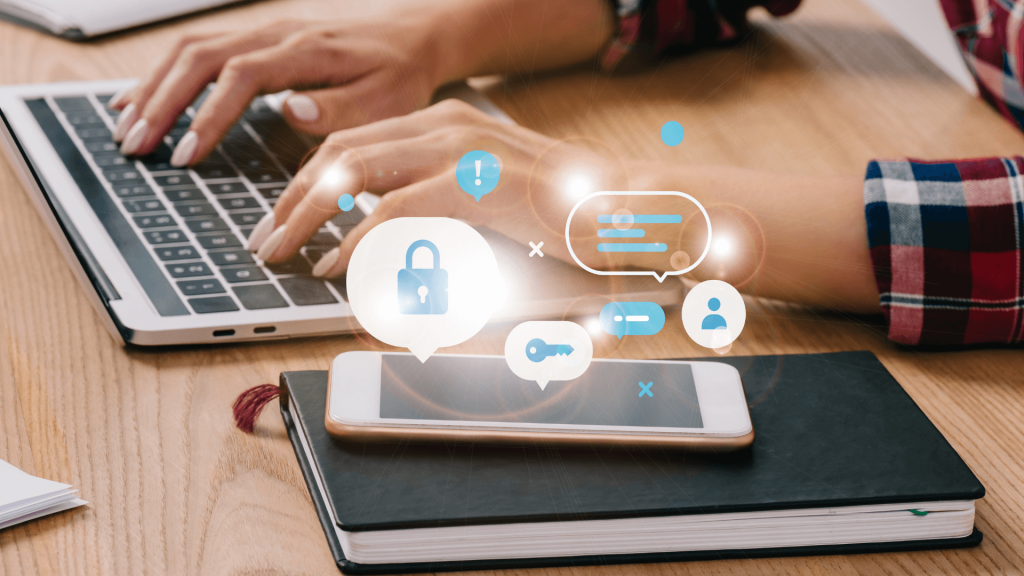6 Essential Cybersecurity Tips for Small Businesses
It used to be that a business being the victim of a cyber-attack was a rare enough thing to warrant its own news story. Today, however, cyber-attacks are occurring at an astonishing rate and are being directed at businesses of all types and sizes.

This is no longer a problem restricted to a few relatively niche cases – most businesses should expect to be the victims of a cyber-attack at some point.
Network & Computer security artwork 2 dark
Below are 6 essential cybersecurity tips for keeping your small business safe.
Make Sure Your Staff Are Properly Trained
The most effective measure that you can take to ensure that your business is safe from cybersecurity threats is to make sure that your staff knows what to look out for. When businesses are targeted by cybercriminals, there is usually a degree of social engineering involved. It’s easier to exploit people than it is to breach modern cybersecurity systems.
However, if your staff already know how to spot common phishing attacks, whether over email or by phone, they won’t be nearly as susceptible to falling for them. Given the benefits of cybersecurity training for your business, it is a worthwhile investment. You can use findcourses.com to find cybersecurity training courses, among a number of other courses that are useful for professionals looking to expand their skillset.
Ban Personal USB Drives
The costs of recovering a corporate network that has been infected by a serious piece of malware or, worse, ransomware, can be phenomenal. When you stack these costs up against the costs of investing in proper cybersecurity measures, including issuing all of your workers with USB sticks to use with work-related devices only, it is much more cost-effective to take preventative measures.
Ideally, you want your workers to only use these USB sticks to transfer files between systems that you know to be clean and free from viruses. As soon as a USB stick is plugged into a personal system, you can no longer be certain that it is free from viruses and safe to introduce to your network. However, you can make it clear to your workers that they shouldn’t be using the USB drives you give them to store personal files. This will prevent some, but not all, viruses and malware from being spread via the USB stick.
Regularly Back Up Critical Files
We are all used to being told to back up our files constantly, but not all of us are very good at heeding this advice. Backing up files is vital for businesses for a number of reasons; it isn’t just to avoid the inconvenience of losing access to important documents. A far more compelling reason is the growing rate at which businesses of all sizes are being hit by ransomware attacks. These attacks involve a type of malware that encrypts business systems, preventing them from being able to access their own files until a ransom has been paid.
Because the effect of losing access to their entire network can be crippling for a business, it often makes more financial sense for them to simply pay the ransom. The only way that you can avoid the impacts of a ransomware attack is by having off-site backups of your systems that aren’t affected by the attack. If you are able to have your systems automatically backed up regularly, then in the event of a ransomware attack, you can restore an earlier version of your system.
Keep Your Software Updated
New vulnerabilities are being discovered all the time in common software. In fact, cybercriminals have a growing incentive to also look for vulnerabilities in the code of more niche software, now that the cat is out the bag when it comes to the money to be made from attacking businesses. Whether through extorting money out of them with ransomware or through good old-fashioned corporate espionage, cybercriminals can make big returns by exploiting known vulnerabilities.
These vulnerabilities are sold on the dark web and exchanged on hacker forums, sometimes before developers or security researchers have been able to identify them. However, as soon as new attack vectors are identified and it becomes clear how their software can be exploited, developers will rush to fix the problem as soon as possible. For corporate customers, it is especially important that the systems they rely upon for running their business are secure.
Of course, this is dependent upon customers updating their software. If their systems support over the air updates, then this can be managed remotely and updates can be pushed to machines without any action from the customer. However, if you are responsible for managing your own updates, then it is vital that you develop a consistent schedule for doing so that enables you to keep all of your systems updated all the time tracker. That includes hardware and software – don’t leave any holes in your security.
One of the most common reasons that businesses put off installing vital updates is that they can’t afford the downtime. However, the potential impacts of not keeping all of your systems properly updated are far more serious than just downtime.
Implement Proper Permission Controls
Proper data security is vital. If you can’t keep your customers’ data or your sensitive business data secure, then your reputation will suffer. Consumers today are very conscious about issues surrounding data security and they won’t tolerate you being blasé with their data, especially not when the data concerned can be used to steal their identity.
Fortunately, you can significantly enhance your data security by following one rule – only people who need to access data should have access to it. By compartmentalizing your data and breaking it up so that individuals only ever have access to the parts of it that they really need, you greatly reduce the scope for unauthorized data access and you limit the impact of a breached user account.
If someone were to steal the login credentials of someone on your network and use them to log in, they would only be able to see what that user would be able to see – they can’t use it as an entry point for general access of your databases. Of course, if they manage to steal the credentials of someone high ranking enough, then that might give them access to everything that you have on your systems, but as long as you can keep those login details safe, you will be ok.
Use a Web Filter
Web filters aren’t just a way of minimizing the amount of productivity that you lose to employees looking up cat videos and the like online; they are also an effective way of making it more difficult for someone to, whether deliberately or not, access malicious websites. Sophisticated phishing attacks can deploy a number of techniques to disguise the malicious URLs that they are really sending people to. Even to vigilant users, they can look like legitimate websites.
With a web filter, you can make it impossible for your systems to connect to any servers that are already known to be part of phishing networks.
You cannot put a price on good cybersecurity – not when businesses of all sizes are now under threat. You need to ensure that you not only invest in proper defenses, including training your staff on how to spot and respond to common cybersecurity threats, but you also need to keep your systems updated and use proper permission controls.


